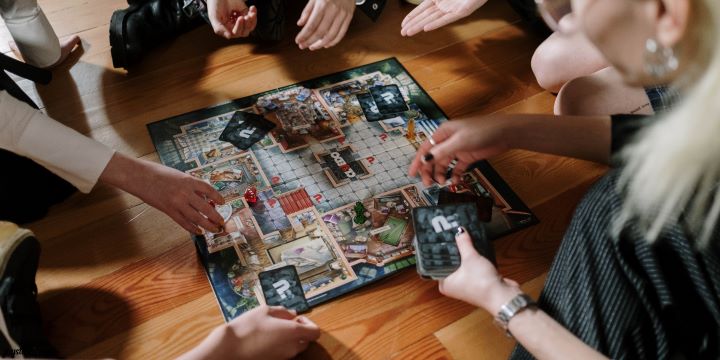Benefits of Playing Board Games as a Family
Table of Contents
- Introduction
- Bonding Time
- Cognitive Development
- Stress Relief
- Life Skills
- Unplugging from Screens
- Enhancing Communication
- Revisiting Traditions
Playing board games as a family offers numerous benefits, enhancing relationships and individual skills. It fosters communication and teamwork, creating opportunities for family members to bond and understand each other better. These games also teach valuable life skills such as patience, strategy, and problem-solving. Children, in particular, benefit from improved cognitive and social abilities, including critical thinking and cooperation. Moreover, board games provide a fun and engaging way to spend quality time together, away from screens and digital distractions. They can also alleviate stress and create joyful memories, reinforcing family connections and making them an essential activity for healthy family dynamics.
Introduction
Playing board games has been a beloved pastime for many decades, offering many hours of amusement. Beyond the fun, playing board games as a family provides numerous benefits that can positively impact various aspects of life. Whether diving into a strategy game, a word game, or a classic, family board games are a fantastic way to bring people together for an engaging experience. Let’s dive into some of the perks of gathering around the game board with loved ones.
Bonding Time
One of the key benefits of playing family board games is creating cherished memories with your loved ones. In our fast-paced world, finding quality time to spend with family can be challenging. Engaging in board games facilitates meaningful interactions and strengthens family ties. Moments spent strategizing, laughing, and celebrating small victories create lasting memories. These shared experiences help build trust and mutual understanding among family members, fostering a sense of unity and cooperation. Additionally, family board games offer a fun and engaging way to disconnect from digital distractions, allowing everyone to focus on each other and enjoy the present moment. Games can be a safe space for expressing emotions and developing deeper connections. Playing board games together as a family fosters a sense of cohesion and belonging, which is crucial for developing solid bonds.
Cognitive Development
Board games are more than just entertainment; they are an excellent tool for cognitive development. Games such as chess, Scrabble, or even simple jigsaw puzzles can improve critical thinking, problem-solving skills, and memory. According to scientific research, engaging in mentally stimulating activities, like playing board games, can even slow cognitive decline.
Moreover, many board games require strategic planning and foresight, enhancing a player’s ability to think ahead and plan for future moves. These abilities can be applied in practical settings, improving a person’s capacity to meet obstacles and find practical solutions. Regularly engaging in such games can also boost attention spans and improve concentration.
Stress Relief
For many people in today’s environment, stress is a regular companion. Board games offer a perfect way to unwind and destress. Playing, focusing on the game, and having fun can divert the mind from daily pressures. Games that involve humor or lighthearted competition can be especially effective in reducing anxiety, as laughter has been shown to relieve stress.
Additionally, the social interactions during gameplay can provide emotional support and foster a sense of belonging. Sharing a laugh over a game or engaging in friendly competition can release endorphins and promote a positive mood. This communal aspect of board games can be vital in managing stress and promoting overall mental well-being.
Life Skills
Playing board games can also help in developing essential life skills. Many games require players to take turns, follow rules, and strategize, fostering patience and discipline. Additionally, games that involve trading, negotiation, or managing resources can teach financial literacy and decision-making skills to both children and adults.
For example, games like Monopoly teach players about money management and the importance of making wise investments. These abilities are helpful in real life as well as the game environment. Youngsters can become more responsible adults by learning about the effects of their decisions and grasping how to make plans.
Unplugging from Screens
Board games are an excellent diversion in a screen-dominated age. It is invaluable to encourage family members to put down their electronic devices and engage in face-to-face interaction. This change can improve attention spans, eye health, and even posture. It’s a wholesome way to spend quality time together without the distraction of digital noise.
By reducing screen time, families can also minimize the adverse effects of excessive electronic device use, such as eye strain, sleep disturbances, and decreased physical activity. Board games provide an opportunity to engage in a more active and social pastime, promoting a balanced and healthier lifestyle.
Enhancing Communication
Effective communication is vital to any relationship; board games provide a platform to practice and enhance these skills. Players hone their verbal and nonverbal communication abilities through dialogue, compromise, and sometimes lighthearted humor. It’s a subtle yet powerful way to build better understanding and empathy among family members.
Furthermore, cooperative play is necessary for many board games, which can aid in developing players’ interpersonal and teamwork skills. These skills are essential in personal and professional settings, making board games valuable for enhancing interpersonal communication.
Revisiting Traditions
Lastly, playing board games as a family allows for preserving and creating traditions. The treasured games many families have passed down through the centuries foster a sense of continuity and cohesion. Even introducing new games can become a tradition, giving family members something special to look forward to during gatherings and holidays.
These customs can create a feeling of identity and belonging while fortifying familial ties. They make a shared history that can be treasured and remembered, fostering a sense of pride and connection among family members. Whether it’s a weekly game night or a holiday tradition, these moments become integral to family life.
In conclusion, playing board games as a family offers numerous benefits, including quality time, strengthened bonds, and lasting memories. These shared experiences foster trust, mutual understanding, and cooperation. Families can enjoy meaningful interactions that enhance their overall connection and well-being by engaging in fun, screen-free activities.














